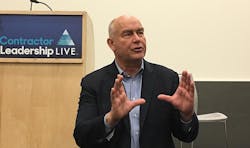Keeping Customers is a Teachable Skill
CLEVELAND, OHIO — The purpose of a business is to get and keep customers, said Mark Matteson, paraphrasing the legendary management guru Peter Drucker. Keeping customers by building rapport with them is a teachable skill, Matteson said, and it’s much better to keep a customer than to try to find a new one.
Matteson, an international speaker and best-selling author of 15 books, has been called "The Oracle of Optimism." A gifted storyteller, Matteson started as an HVAC service technician in 1976, but he turned into an expert salesman because of his ability to connect with people. Matteson talked about soft skills to a roomful of contractors at the Contractor Leadership Live conference and show here at the Huntington Convention Center in mid-September.
It costs $1 to keep a customer and $7 to find a new one, he pointed out.
It comes down to active listening. Everybody has a story to tell, Matteson noted, and they’d love to tell it to you. He takes personal pride in being to ask a stranger a few questions and have them talk about themselves non-stop for 20 minutes without realizing it. Keep the conversation going by asking a few questions, he advised and mirror their body language because that makes your companion feel that you’re just like them. Actively listen. Pause for three to five seconds before you say anything because you don’t want to cut the other person off. Ask questions for clarification, such as, “what exactly do you mean,” or “can you give me an example?”
“Forget closing the sale,” he said. “Open the relationship.”
Paraphrase what the other person is saying. It ties the conversation together.
In any customer service environment, you’re going to encounter and angry customer. Listen to them and let them vent. Then ask them quite simply, “What would you like us to do?” Chances are, it won’t be expensive; they may just want to beef. Others can be won over if they’re offered something nominal.
Matteson said he personally is turned off whenever a service provider begins with, “Our policy doesn’t allow us …” He doesn’t want to hear about your policy. He recounted the story of a young musician who had his guitar broken by United Airlines, only to be told that it wouldn’t compensate him. In response, he wrote a song entitled, “United breaks guitars,” and posted it on YouTube. After 17.5 million views, and untold damage to its reputation, United ended up donating $3,000 to the Thelonious Monk Institute of Jazz.
Matteson is a fan of acronyms because it makes desired behaviors easier to remember. He recommended goal-setting that revolves around what he called the Four Ps: they’re personal, in the present tense, powerful and positive. Dominate the listening in every conversation could be one.
For every goal, you should also write down three or four reasons why you want that goal. If you know what you want and why, the how tends to take care of itself.
Another handy acronym is L.E.S.T.E.R., with the L standing for listen actively, also known as “shut your pie hole.” E stands for echo emotion that you’re hearing from the customer, which could be anger, frustration, disappointment or aggravation. You’re hearing them. S is sympathy/empathy. Sometimes having your service manager give a sincere apology might be enough.
Matteson opined that just the first three, L.E.S., properly employed, would help you keep a lot of existing customers. When you keep them, then you can ask them for referrals. He asked the contractors if they were familiar with the concept of “churn,” the percentage of customers that you lose each year. Your goal should be to keep it well under five percent.
T stands for thank the customer. A handwritten thank you note is amazing, he said. Even if the customer gives negative feedback, without feedback you will not grow.
E is for evaluate. If something went wrong, what is it? Is one technician the problem or is your process bad or missing steps?
R is for respond. Now that you have this information, do something with it. Teach the listening process to your technicians. Reward your techs when they do it right.
